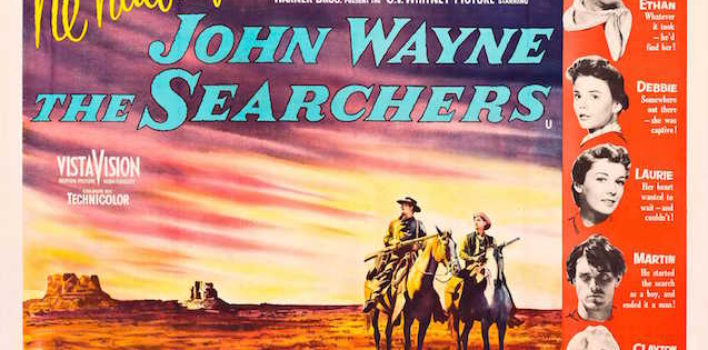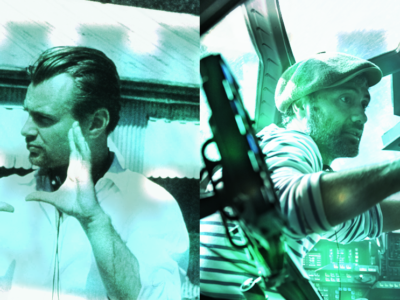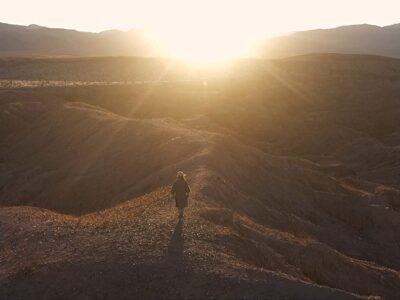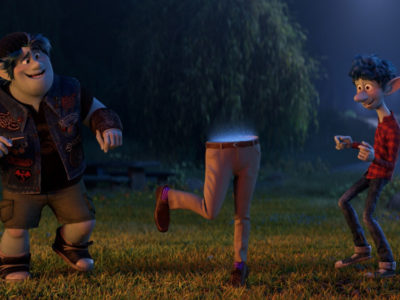Reviewing the Classics| The Searchers
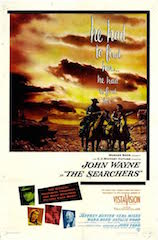 I love a good western. It is the quintessential American genre. A portrait of ourselves at both our most noble and most despicable. A genre of selfless heroes and terrible villains. A showcase of the American landscape, as seen by the men and women who first braved to cross it – full of wonder and awe.
I love a good western. It is the quintessential American genre. A portrait of ourselves at both our most noble and most despicable. A genre of selfless heroes and terrible villains. A showcase of the American landscape, as seen by the men and women who first braved to cross it – full of wonder and awe.
There is no better western than The Searchers.
Sixty years ago this year, The Searchers made its debut and forever changed the western – even though it was tepidly received upon its initial release. Today it is revered by casual filmgoers, critics, and filmmakers as one of the most important films of all time. It is one of director John Ford’s best films and arguably star John Wayne’s best performance of his career.
The film follows a former Confederate soldier, Ethan Edwards (John Wayne), and his kinsman, Martin Pauley (Jeffrey Hunter), as they brave obstacles (natural and unnatural) and the slow passage of time to attempt to find a member of their family kidnapped by the Comanche Indians. The journey becomes an unhealthy obsession, as Ethan’s quest to find his niece Debbie slowly devolves into vengeance-fueled madness.
The Searchers has influenced many filmmakers in the six decades since its debut. Legendary director Martin Scorsese has often cited The Searchers as one of his favorite films and has talked extensively about the film. The movie’s staying power is derived from its themes and characterizations. The film has a lot to say about thematic concepts that are just as relevant to today’s world.
SPOILERS AHEAD
The Picturesque West of John Ford
With each film of his I see, John Ford becomes more and more one of my favorite directors. His instincts on camera placement, movement and focus are amazing. Ford really cemented his place in cinema history as being the vision of the west that most movie audiences picture in their minds.
The Searchers was filmed almost entirely in Monument Valley, located in both Arizona and Utah. It was a favorite filming location of Ford’s, as it became a background of many of his films. When modern moviegoers think of the west, it is most likely via Monument Valley, and Ford’s lens. In fact, the most modern western film (that I’ve seen) to utilize Monument Valley was the most recent version of The Lone Ranger in 2013.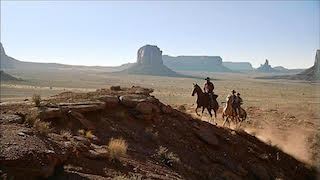
There is really no bad shot in The Searchers. Each one could be frozen as a still and hung up as a painting. The stoic buttes, the sandy monoliths of Monument Valley, stand as a constant in the backgrounds, displaying God’s awesome artistry of the land. The greenery of the valley floor gives those wide shots splotches of mixed colors that are appealing. And that sky – most of the shots are almost two-thirds deep blue with wispy clouds. Simply beautiful.
But the scenery does more than look pretty. Through the eyes of Ford, the land evokes emotion that transfers to the audience. Both the Edwards and Jorgensen homesteads are solitary, almost enveloped by the valley. There are no towns visited as part of the story, just lonely outposts of civilization. Not only does this stir feelings of the hard-scrabble life of the frontier and the rugged individualism of the American west; there is also a loneliness to it that carries itself through the entire picture, creating a visual theme.
The visuals of The Searchers also offer a sort of poetry, the most famous being the first and last shots of the film. The movie opens and closes, literally, with a door. This provides the audience with a window into the expansive wilderness and a way back into the sanctity of the home.
The Western Grows Up
Being a “pioneer” of the western film genre, John Ford was there at its very beginning. His early films reflected a more simple, romantic look at the wild west. In movies like Ford’s Stagecoach (1939), the heroes were gruff but had hearts of gold and the villainous Native Americans were one-dimensional. The world was black and white.
By the time The Searchers came along, Ford was venturing into new territory. The western was now turning shades of gray. There was more honesty to the stories and more layers to the characters. It was a gradual turn, though. Part of Ford’s brilliance with this film is his use of common western tropes of the time and giving them a new twist to ease into the darker nature of the story.
The music, written by celebrated composer Max Steiner, is a classic example of a typical western trope. Steiner was known for his sweeping, epic scores to films like King Kong, Casablanca and Gone with the Wind. The score of The Searchers is no different – using epic phrasing and leitmotifs to make the viewer feel at home in a western. It was an aural framework into which Ford could weave his story.
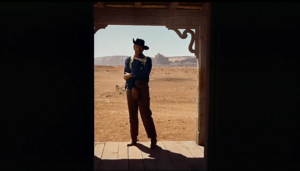 Steiner’s score is also littered with popular tunes of the Civil War era (the film takes place three years after the war’s end) like “Bonnie Blue Flag” and “Lorena.” “Lorena” is especially poignant, as it was very popular on both sides of the conflict, reminding the men of loved ones and home.
Steiner’s score is also littered with popular tunes of the Civil War era (the film takes place three years after the war’s end) like “Bonnie Blue Flag” and “Lorena.” “Lorena” is especially poignant, as it was very popular on both sides of the conflict, reminding the men of loved ones and home.
The presence of The Sons of the Pioneers to the musical makeup of The Searchers is not to be taken lightly. The Sons of the Pioneers were very popular for their cheery, harmonious country singing, and are most famous as a supporting group for Roy Rogers – probably one of the most famous romanticized, “old school” cowboys ever. To include them was also a nod to what had come before, creating a melodic irony in the title song.
But Ford’s biggest trope turnaround was that of the western leading man. With Ethan Edwards, Ford gave star John Wayne one of his most complex characters, and probably his best performance. Ford knew how to use the Duke better than any other director. Just as James Cameron did with Arnold Schwarzenegger, Ford utilized Wayne’s strengths as an actor to maximum effect. Anyone who believes John Wayne was not much of an actor has clearly never really studied The Searchers.
Ford actually made John Wayne a star back in 1939 with Stagecoach. There the Duke was the prototypical western hero – an outlaw, but an honorable one. It was a reflection of the simpler times mentioned above. Wayne’s swagger and charisma soon catapulted him into iconic status. Now people around the world would think of the Duke when they pictured the rugged American cowboy.
In The Searchers, Ford uses Wayne’s heroic persona to catch the audience off guard – making the emotional impact of events taking place much more resonant. The normally fearless Duke is brought to his knees many times at the off-screen sight and recollection of his raped and murdered kin. Martin Scorsese recalled that seeing Wayne like that made him imagine what was offscreen had to be absolutely horrible, more so than anything that could have actually been shown onscreen. Indeed the imagination can be much more terrifying.
Relating the notion of changing tropes to Ethan, it’s interesting that the dynamic between Ethan and Martin is a role reversal – the older, wiser man usually imparts good judgment and humility on to the brash and haughty younger man in the typical western. In The Searchers, however, the younger Martin is the one with common sense and reminds Ethan of his humanity.
Searching for Vengeance
“What makes a man wander? What makes a man roam? What makes a man leave his bed and board, and turn his back on home?”
The Ethan Edwards character himself is a personification of John Ford’s “new old west.” He is a deeply flawed man consumed by vengeance and hatred – the center of the film’s moral questions.
At the beginning of the film’s search, Ethan’s motives for finding Debbie are harder to decipher. We assume that his intentions are noble as a bi-product of seeing the form of John Wayne. But as the search goes on, it becomes clearer that he is on a quest to wreak vengeance on the Comanche, simply for being Comanche. In Ethan’s mind, being Comanche is not being human.
Ethan’s hatred of the Comanche extends even beyond death. Early in the film, Ethan and his posse stumble upon a dead Comanche from the raid that killed his brother Aaron and his family.
https://www.youtube.com/watch?
As Scorsese has pointed out, Ethan is not content to let the dead Comanche rest in peace. He must make sure this dead Indian wanders and suffers forever. The satisfaction on his face as he shoots out the dead man’s eyes is disturbing, and Ethan’s comrades, particularly Reverend Clayton, don’t take too kindly to it.
The name he gives Martin at the end of that scene (“blankethead”) is also a manifestation of his racism. Martin is part Native American, and Ethan spends most of the film denying Martin was his kin – despite being raised by Ethan’s brother as a son.
With Ethan’s demeanor, Ford wrestles with the truth that both the settlers and Native Americans could be both noble and cruel – a fact of our own sin nature. There is no “noble savage” here, nor is there a wholesome settler, either. Even the settler women like Laurie Jorgensen (Vera Miles) exhibit racist tendencies, like when she told Martin that Debbie’s mother would have wanted Ethan to kill De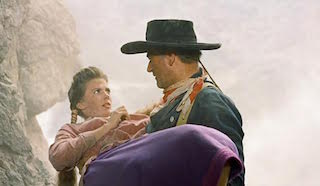 bbie after she had been with the Comanche for so long.
bbie after she had been with the Comanche for so long.
Granted that the Comanche, particularly the chief Scar, are indeed awful in their treatment of the settlers, and there is no justification for the violence against the women and children. However, both Scar and Ethan share their penchant for revenge. Scar’s entire reason for raiding the Edwards homestead and murdering Ethan’s kin was vengeance for the deaths of his sons. It’s a terrible cycle of violence that will not end until one or both of them are dead.
“A man will search his heart and soul, go searchin’ way out there. His peace of mind he know’s he’ll find. But where, of Lord, Lord where?”
Ethan’s quest of hate and revenge is one of the finest cinematic examples of what such feelings to do one’s soul, as well as the physical consequences.
The heart is the source of all sin, and Ethan’s heart, like all men, is tainted with it. It wears us down and has the capacity to eventually destroy us.
In the Book of Matthew, Jesus talks about the nature of the heart when pressed by the religious leaders about what defiles a person (the Pharisees were preoccupied with Jesus’ disciples not washing their hands before they eat):
“But the things that come out of a person’s mouth come from the heart, and this defiles them. For out of the heart come evil thoughts – murder, adultery, sexual immorality, theft, false testimony, slander. These are what defile a person…” (15:18-20)
Ethan’s obsession and motivation come from his heart. He hates the Comanche so much that he is willing to murder Debbie – the object of his search – because she has been “tainted” by the Comanche. It is similar to the “honor killings” practiced by certain cultures in the Middle East, even to this day.
In fact, we don’t really know until the moment he lifts her into the air if Ethan is actually going to kill Debbie. But Ethan’s love for his niece breaks through his hatred of the Comanche, and he simply tells her, “Let’s go home, Debbie.”
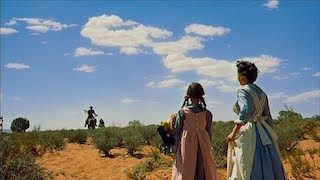 The end of Ethan’s journey reflects the inevitable outcome to following one’s sin. It is subtle yet very powerful visual. Yes, he returns Debbie to her rightful place with family. Martin enters the house arm-in-arm with Laurie. But Ethan stays outside the house – feeling unworthy to enter. He leaves the homestead just as he came: alone.
The end of Ethan’s journey reflects the inevitable outcome to following one’s sin. It is subtle yet very powerful visual. Yes, he returns Debbie to her rightful place with family. Martin enters the house arm-in-arm with Laurie. But Ethan stays outside the house – feeling unworthy to enter. He leaves the homestead just as he came: alone.
Scorsese again points out something very important here. In a brilliant bit of irony, it is Ethan who is now cursed to wander “between the winds” – just as he had cursed the dead Indian to an eternity of searching for absolution. Shut out from all that is good in his life, wracked with guilt because of what he had and could have done.
There is no real satisfaction for those that pursue life with vengeance and hatred in their hearts. All those who follow their evil desires will find themselves in the end eternally wandering apart from God – an eternal hopelessness and emptiness.
The Searchers really teaches a hard fact about humanity: we all have the capacity to do great evil, no matter our skin color. Though the door may have closed on Ethan, God’s door is still wide open. Because He loves us with an eternal, unconditional love, we are all deemed worthy to enter.
“But because of His great love for us, God, who is rich in mercy, made us alive with Christ even when we were dead in transgressions – it is by grace you have been saved.” Ephesians 2:4-5


